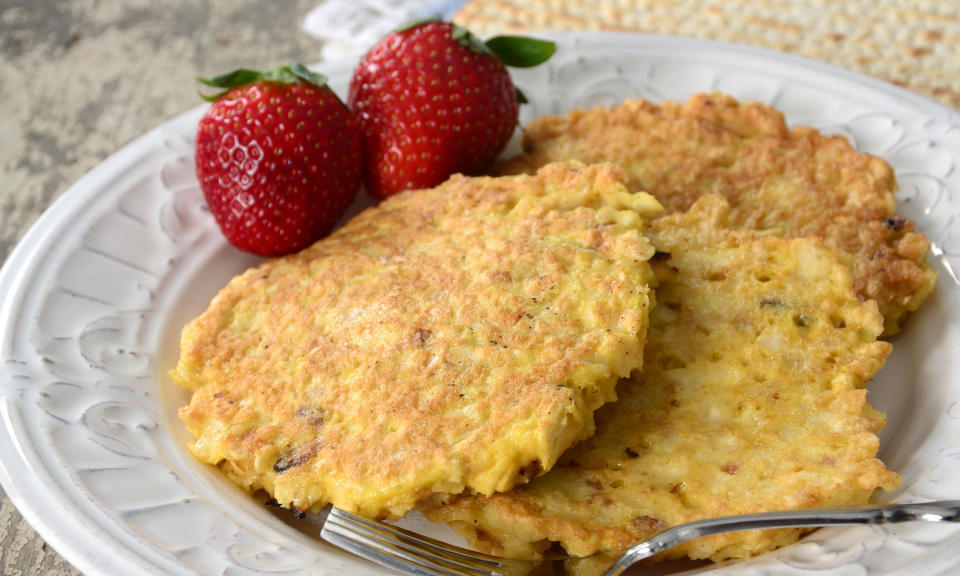What 'Kosher for Passover' Actually Means
In the Jewish tradition, every spring, there's an eight-day holiday called Passover-Pesach, in Hebrew-that commemorates the events of 1300 B.C.E., when God freed Jewish people from slavery in Egypt, and they escaped thanks to Moses' leadership. Or, as my friend, Allison Poirier, a third-year rabbinical student at Hebrew College in Boston, puts it, Passover celebrates "all the things that took [Jews] out of Egypt. ... God gave the commandment that every year, at this time, you should do certain things to remember how the Jews escaped Egypt. So, you're supposed to eat certain things, and you're supposed to tell the story [to commemorate the liberation.]" Passover is one of the most important holidays in Jewish tradition, and-as such-there are a number of particular customs that are observed over the eight day period. For the most part, these all have to do with food and they can be summed up as "keeping kosher for Passover."
Many Jewish people choose to keep kosher in their day-to-day lives, which means that they follow specific rules related to diet and food. As Allison explains, there are two different parts to this, "[First,] there are certain foods that you should never eat: Pork, shellfish, bugs, snakes, and creepy crawly things... so no frog legs. And then, there are things you eat in a certain way. You are not to mix dairy and meat products, so some people take that all the way to having separate plates [for meat and dairy], some people just don't eat cheeseburgers."
But over Passover, there are additional rules. "You keep all the regular kosher rules," says Allison, "and then on Passover, you're also not supposed to eat any of the five grains, which are wheat, barley, rye, oats, and spelt. Any of those five things, that have come into contact with water or yeast and started to rise, can't be eaten on Passover." Why? Well, as Allison explains the story in the Book of Exodus, "The Jews were rushed out of Egypt, and they only had time to mix the dough... they didn't have the luxury of letting bread rise, so they could only hope that it would turn into something edible [as they were running away.] It's also related to...all these things in the Bible about different sacrifices [you're supposed to make]." And it's not just that you're not allowed to consume these foods-you're also not supposed to see them, so things like bags of oats, boxes of pasta, and loaves of bread are removed from the home in the days leading up to Passover.

However, different Jewish traditions can have slightly different approaches to what's okay and what's not on a Passover table: "People from Eastern European ancestry have a second category of stuff that [isn't allowed:] rice, legumes-like peas and beans-and corn." This is partially because these foods can be made into flour-substitutes, and partially because often these foods are processed and grown in the same places as the five forbidden grains, so there could be cross-contamination. However, other groups-like those from southern Europe and Africa-accept these foods as a-okay for Passover consumption.
Over Passover, there are feasts called Seders that happen on the first two nights of the holiday. The purpose is to come together to tell and discuss the story of the escape from slavery, while also partaking of symbolic drinks and foods, like matzo, the cracker-like bread meant to represent what Jews ate after they escaped from slavery. If you're a non-Jewish person invited to a Seder or some other celebration with Jewish folks during Passover, you want to be respectful of the dietary considerations of other people there.
What are some good things to bring? "If you want to be safe," says Allison, "raw stuff-like fruit and vegetables-is very safe. [Kosher] wine is good. Don't bring beer or scotch, because those things have wheat and rye in them. A lot of stuff secretly has corn syrup in it, so if people aren't eating that second category of foods, be aware."

With bread products off the table, typical breakfast foods-like toast, cereal, pastries, and bagels-have to be replaced. "Passover food, after the first few days, is not so delicious. My breakfast routine takes a hit. Mostly it's fruits and hard-boiled eggs. Hippy, happy, healthy yogurt with no corn syrup or preservatives is good," says Allison. But there are also Passover-specific specialties to look forward to: "Matzo brei, of course! That's a staple. Haroset, a symbolic food that goes on the Seder plate, is made up of fruits and nuts and cinnamon... that's a great breakfast food. Spread that on some matzo and you're ready to go. Gefilte fish, also, is a popular Passover food. It's an acquired taste, but it's so good. It's not for breakfast, for me, but you could eat it then."
More than anything, though, Passover is a time to come together, whatever you end up eating.


